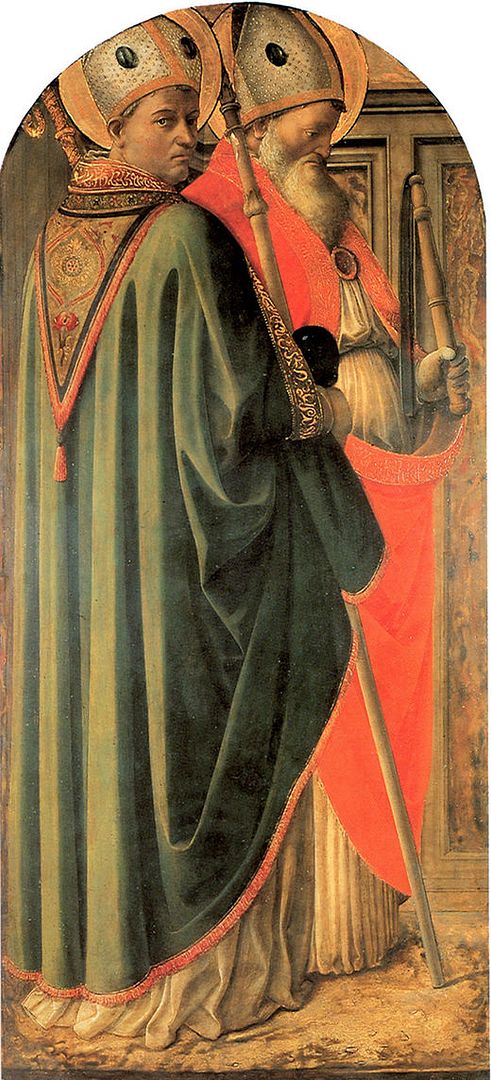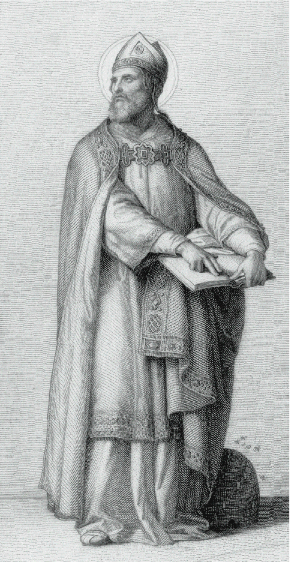Today, December 7, we celebrate the feast day of Saint Ambrose (340-397 ), baptizer of Saint Augustine, and one of the Four Great Doctors of the Church. Saint Ambrose, the “Honey-Tongued Doctor,“ exemplifies for the faithful the truly universal character of Christianity. Fully embracing the learning, law and culture of both those who came before him, as well as that of his contemporaries, Saint Ambrose had a transcendent knowledge and perspective of the world and its activities and riches. Preaching active involvement in the events of daily life, Saint Ambrose reminds us that the true activity we must focus on is the study of the Scripture, and the transcendent freedom that we experience as a result!
A prolific writer, Saint Ambrose instructed the faithful with countless books, letters, hymns, and sermons. Here, he offers “Some Advice on Prayer.”
Offer to God a sacrifice of praise and pay your vows to the Most High. To praise God is both to make your vow and to fulfil it. That is why the Samaritan in the story is placed above his companions: with nine other lepers he was cured of his leprosy by the command of the Lord, but he alone came back to Christ, praised the greatness of God and gave thanks. Jesus said of him: There was none of these who returned and thanked God, except this foreigner. And he said to him: Rise up and go on your way, for your faith has made you whole.
The Lord Jesus also taught you about the goodness of the Father, who knows how to give good things: and so you should ask for good things from the One who is good. Jesus told us to pray urgently and often, so that our prayers should not be long and tedious but short, earnest and frequent. Long elaborate prayers overflow with pointless phrases, and long gaps between prayers eventually stretch out into complete neglect.
Next he advises that when you ask forgiveness for yourself then you must take special care to grant it also to others. In that way your action can add its voice to yours as you pray. The apostle also teaches that when you pray you must be free from anger and from disagreement with anyone, so that your prayer is not disturbed or broken into.
The apostle teaches us to pray anywhere, while the Savior says Go into your room – but you must understand that this “room” is not the room with four walls that confines your body when you are in it, but the secret space within you in which your thoughts are enclosed and where your sensations arrive. That is your prayer-room, always with you wherever you are, always secret wherever you are, with your only witness being God.
Above all, you must pray for the whole people: that is, for the whole body, for every part of your mother the Church, whose distinguishing feature is mutual love. If you ask for something for yourself then you will be praying for yourself only – and you must remember that more grace comes to one who prays for others than to any ordinary sinner. If each person prays for all people, then all people are effectively praying for each.
In conclusion, if you ask for something for yourself alone, you will be the only one asking for it; but if you ask for benefits for all, all in their turn will be asking for them for you. For you are in fact one of the “all”. Thus it is a great reward, as each person’s prayers acquire the weight of the prayers of everyone. There is nothing presumptuous about thinking like this: on the contrary, it is a sign of greater humility and more abundant fruitfulness.
Why pray the Rosary every day for a year?
Each time the Blessed Virgin has appeared-- whether it be to Saint Bernadette Soubirous at Lourdes; to Lucia, Jacinta, and Francisco at Fatima; or to Mariette Beco at Banneux-- she has asserted the importance, saving grace, and power of praying the Holy Rosary on a daily basis. Based upon her words, the Rosary is penance and conversion for sinners, a pathway to peace, an end to war, and a powerful act of faith in Jesus Christ. Pope Paul VI presented the Rosary as a powerful means to reach Christ "not merely with Mary but indeed, insofar as this is possible to us, in the same way as Mary, who is certainly the one who thought about Him more than anyone else has ever done."
To show us how this is done, perhaps no one has been more eloquent than the great Cardinal Newman, who wrote: "The great power of the Rosary consists in the fact that it translates the Creed into Prayer. Of course, the Creed is already in a certain sense a prayer and a great act of homage towards God, but the Rosary brings us to meditate again on the great truth of His life and death, and brings this truth close to our hearts. Even Christians, although they know God, usually fear rather than love Him. The strength of the Rosary lies in the particular manner in which it considers these mysteries, since all our thinking about Christ is intertwined with the thought of His Mother, in the relations between Mother and Son; the Holy Family is presented to us, the home in which God lived His infinite love."
As Mary said at Fatima, "Jesus wants to use you to make Me known and loved. He wishes to establish the devotion to My Immaculate Heart throughout the world. I promise salvation to whoever embraces it; these souls will be dear to God, like flowers put by Me to adorn his throne."

Subscribe to:
Post Comments (Atom)












0 comments:
Post a Comment
Thanks for leaving a comment. If you wish to submit a prayer request, however, please do so above, using the "Contact" tab.